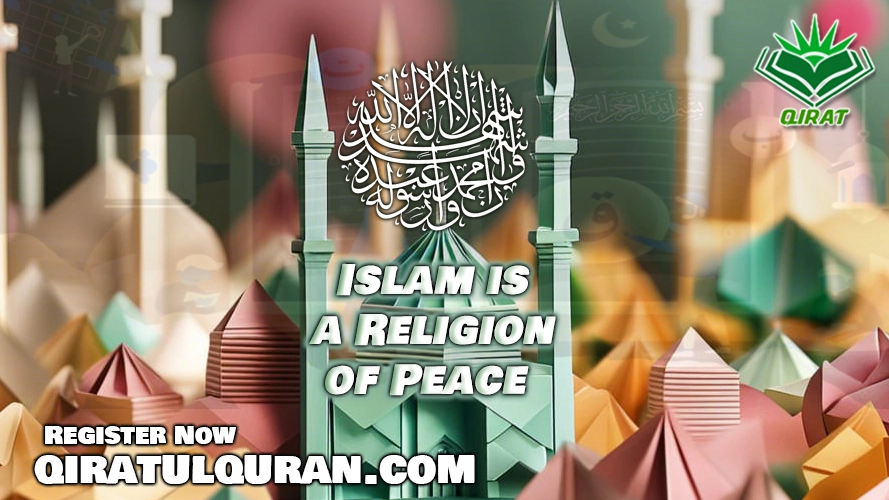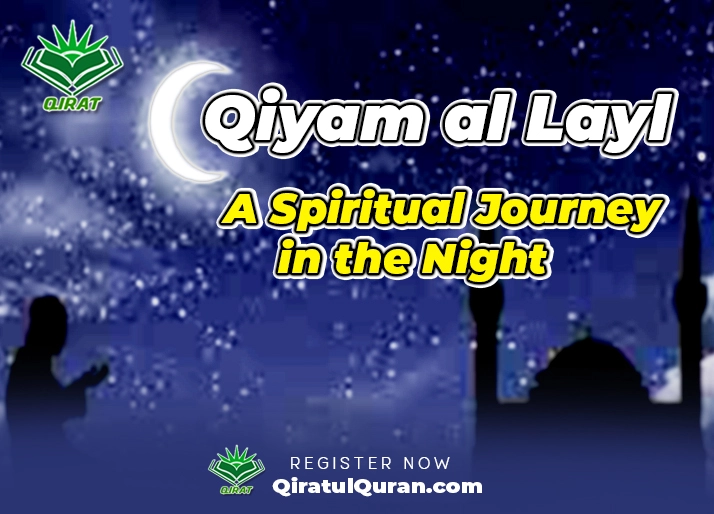Islam’s Foundations of Peace
Islam is a Religion of Peace: Islam was founded on principles of peace, justice, and submission to God’s will. The Arabic word “Islam” literally means “surrender” or “submission.” Muslims believe God is beneficent and merciful, emphasizing peaceful coexistence. The Quran states “Allah commands justice and fair dealing…” (16:90). Prophet Muhammad S.A.W himself spread Islam through nonviolent preaching in Mecca despite facing persecution. Core Islamic beliefs thus revolve around compassion, honesty, and respect.

Qiratul Quran will guide you about the Quran contains many verses promoting patience, turning away from aggression, and responding to evil with good: “Repel evil with that which is better” (41:34). Muslims believe jihad refers to an internal spiritual struggle against sinful temptation or the “greater jihad.” The “lesser jihad” denotes external self-defense only. Terrorists tragically distort the concept of jihad to justify violence against innocents. However, mainstream Muslims understand jihad as a personal effort to follow God’s will.
Histories of Religious Tolerance
Islam has coexisted relatively peacefully with other faiths for centuries. The Quran recognizes Christians and Jews as “People of the Book” due to their belief in one God and shared prophets. As People of the Book, they received dhimmi status under historical Muslim rulers allowing them autonomy and religious freedom.
For instance, the Ottoman Empire granted religious liberty to minorities in exchange for loyalty to the state. The Ottoman millet system allowed each religious community self-rule in issues of worship, family law, and education. Similarly, during the Abbasid Caliphate, Muslims, Christians, Jews, Zoroastrians, and Hindus lived together in Baghdad relatively harmoniously as faith communities guided by their own laws and leaders.
Prominent Muslim rulers even hired non-Muslims into high government positions based on merit. These histories show Islam’s capacity for religious pluralism and diversity. Although flare-ups did occur, Islamic societies were generally more tolerant than in medieval Europe. Muslims who persecute minorities today violate their own faith’s heritage.
Islamic Ethics of Love and Charity
The Prophet Muhammad taught extensively about displaying love, compassion, honesty, and generosity. The Quran states, “Muhammad is the Messenger of God, and those who are with him are strong against unbelievers but compassionate towards one another” (48:29). Muslims strive to model the Prophet’s morality and emulate God’s names like “The Compassionate” and “The Merciful.”
Zakat, or charity, is one of the Five Pillars of Islam. Muslims must donate 2.5% of their wealth annually to the poor. Throughout history, Islamic civilizations founded charitable endowments called waqfs supporting schools, hospitals, and other public services. Today, Muslim charities provide global humanitarian relief reflecting Islam’s social justice ethos. The Islamic virtue of mercy is personified in the Prophet’s teachings. Therefore, Islam is a Religion of Peace and love.
Condemning Terrorism and Extremism
Tragically, some militants distort Quranic verses and Prophetic sayings to justify violence against civilians and governments. However, mainstream Muslim scholars adamantly condemn terrorism as prohibited in Islam.
The acts of militant groups like ISIS and Al-Qaeda are denounced across the Muslim world. In an open letter, over 100 British imams declared, “We will not allow their deviant ideology to divide our society and spread violence, hatred, and division.” Major Muslim organizations actively counter radicalization and promote tolerance.
Polls indicate the vast majority of Muslims reject violence against civilians. However, news headlines disproportionately focus on terrorists rather than everyday peaceful Muslims. While vigilance against extremism is needed, it is unjust to portray Islam overall as a religion of violence.
Hope for the Future & Islam is a Religion of Peace
Islam’s core principles revolve around peace, justice, and submission to God’s merciful will. For centuries, Muslims lived relatively harmoniously with other faiths compared to medieval Europe. However, the religion faces challenges today from small extremist factions. Moving forward, increased interfaith dialogue and cooperation can promote understanding. There is hope Muslims worldwide will reclaim their religion’s heritage of coexistence and continue spreading its eternal message of love and compassion.
Islam Provides Comprehensive Guidance
Islam is not just a religion in the narrow sense, but a complete way of life. Its teachings offer guidance for all aspects of human existence, both spiritual and worldly. Islam provides a holistic framework for living in line with one’s purpose, leading to ultimate happiness and inner peace.
theology and Ritual Worship
The core foundation of Islam is theological belief in the Oneness of God and the prophethood of Muhammad. Islam prescribes ritual acts of worship designed to instill God-consciousness and humility. The Five Pillars of Islam provide structured religious practice, including the declaration of faith, five daily prayers, charity, fasting, and the Hajj pilgrimage. These rituals connect believers to God and the Islamic community.
Salat: Embedding Worship Into Daily Life
The prescribed five daily prayers, known as salat, occur at dawn, noon, afternoon, sunset, and nightfall. Salat incorporates recitations from the Quran and physical motions like bowing and prostration. These movements and reminders scattered throughout the day maintain mindfulness of God and faith. Adhering to salat instills discipline and routine as well.
Social Welfare System
Islam places great emphasis on building a just socio-economic order. The mandatory annual charity known as Zakat funds welfare programs for the needy. Islam also prohibits usury, ensures fair business ethics, and calls for equitable distribution of wealth. During the holy month of Ramadan, Muslims fast to experience hunger and grow in empathy for the less fortunate.
Marriage and Family Values
Marriage is highly encouraged in Islam. Spouses must care for each other with love, mercy, and mutual consultation. Islam grants women rights in marriage, such as conditions in the marriage contract and the right to divorce if needed. Raising children with moral guidance is a key responsibility. Extended family ties are emphasized as well. These principles secure the family unit.
Islamic Jurisprudence
One of Islam’s hallmarks is its extensive legal code regulating all aspects of private and public life in keeping with moral and spiritual ideals.
Shariah Law
Shariah literally means the “clear path” or “way” to life’s purpose. It covers acts of worship, business dealings, diet, entertainment, dress, inheritance, marriage, crime, and more. Islam views the spiritual and material worlds as interconnected, so Shariah aims to order earthly affairs according to divine justice.
Principles of Justice and Ethics
Shariah emphasizes ethical ideals like truthfulness, patience, sincerity, and fulfilling contracts. Crimes have strict burdens of proof, and privacy rights limit intrusive investigations. The regulations cultivate communal harmony and justice, based on texts from the Quran and Sunnah.
Adaptability of Islamic Jurisprudence
While the foundational texts remain fixed, Shariah can evolve with the times through scholarly legal reasoning and consensus. Historic Muslim societies applied Shariah in myriad ways shaped by local cultures. This flexibility allowed Islam to thrive worldwide. Muslims today continue deriving applicable guidelines from Shariah to navigate modern realities.
Holistic Worldview and Spirituality
Beyond formal rituals, Islam offers a holistic approach to cultivating well-rounded spirituality and inner peace.
Balancing Physicality and Soul
Islam views the spiritual and physical realms as interconnected. The human constitutes both the heavenly soul and the earthly body. Islam teaches that both domains require nourishment – via divine remembrance and worldly sustenance. Therefore, religion prescribes a balanced lifestyle meeting both bodily needs and spiritual aspirations.
Islamic Spiritual Practices
Beyond salat, various voluntary spiritual practices nurture the soul. These include reciting additional prayers, engaging in dhikr (remembrance of God), reading the Quran, abstaining from wrongdoing, and reflecting on existence. Sufism has also cultivated methods for deepening one’s inner life.
Conclusion About Islam is a Religion of Peace and Love
In essence, Islam provides comprehensive guidance for optimal living. Its practical teachings foster spiritual growth while creating a just, ethical society. Islam recognizes human nature and offers a complete system allowing people to actualize their highest potential in a holistic manner. For Muslims, the Islamic way of life leads to fulfillment in both this world and the eternal hereafter. Therefore, Islam is a Religion of Peace and love.





